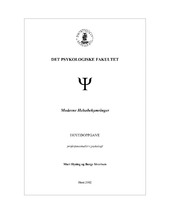Moderne Helsebekymringer
Abstract
Objective: In a previous study in New Zealand, the newly developed Modern Health Worries Scale (MHW) was significantly correlated with Subjective Health Complaints (SHC) and health care utilization. The aim of the present study was to investigate the prevalence of MHW, and its relationship to SHC in a Norwegian population. We also wanted to explore the mediating effects of negative affect and different coping styles on the relationship between MHW and SHC. Design: 527 Norwegian university students completed a questionnaire measuring worries about modernity, subjective health complaints, negative affect, and coping strategies. Results: The prevalence of MHW was high; 20-30% of the students reported that they were “extremely” or “very worried” on roughly half of the MHW-items. The relative risk of poor self-rated health was significantly associated with a high level of MHW (OR=1.7, CI=1.19-2.41). This relationship was still significant after adjusting for negative affect. When adjusting for illness-related coping the odds-ratio was reduced by 26% to a non-significant level. This is a coping style where subjects focus and search for symptoms when confronted with the risks. A similar trend was seen with avoidant coping styles. Conclusion: There was a strong relationship between worries about modernity and subjective health complaints. Both emotional and cognitive factors play a central role in explaining this association. Bakgrunn: I et tidligere studie fra New Zealand var det ny-utviklede Modern Health Worries Scale (MHW) signifikant korrelert med subjektive helseplager (SHC) og bruk av helsetjenester. Målet med vårt studie var å undersøke prevalensen av MHW, og forholdet mellom MHW og SHC i en norsk populasjon. Vi ønsket videre å undersøke den medierende effekten av negativ affekt og ulike mestringsstiler på forholdet mellom MHW og SHC. Design: 527 høyskole- og universitetsstudenter fylte ut spørreskjema om moderne helsebekymringer, subjektive helseplager, mestringsstiler og negativ affekt. Resultat: Prevalensen av moderne helsebekymringer var høy: 20-30% av studentene rapporterte at de var “alvorlig” eller “svært bekymret” for om lag halvparten av leddene i MHW. Relativ risiko for subjektive helseplager var signifikant assosiert med høy grad av bekymring (OR=1.7, CI=1.19-2.41). Denne sammenhengen var fortsatt signifikant etter å ha kontrollert for negativ affekt. Ved å kontrollere for sykdomsrelatert mestringsstil ble odds-ratio redusert med 26% til et ikke-signifikant nivå. Dette er en mestringsstil der forsøkspersonen fokuserer og søker etter symptomer når de blir konfrontert med en risiko. En lignende tendens ble funnet for unngående mestringsstil. Konklusjon: Det var en sterk sammenheng mellom moderne helsebekymringer og subjektive helseplager. Både emosjonelle og kognitive faktorer spiller en sentral rolle i å forklare dette forholdet.
Publisher
The University of BergenCopyright
Copyright the author. All rights reservedThe author
